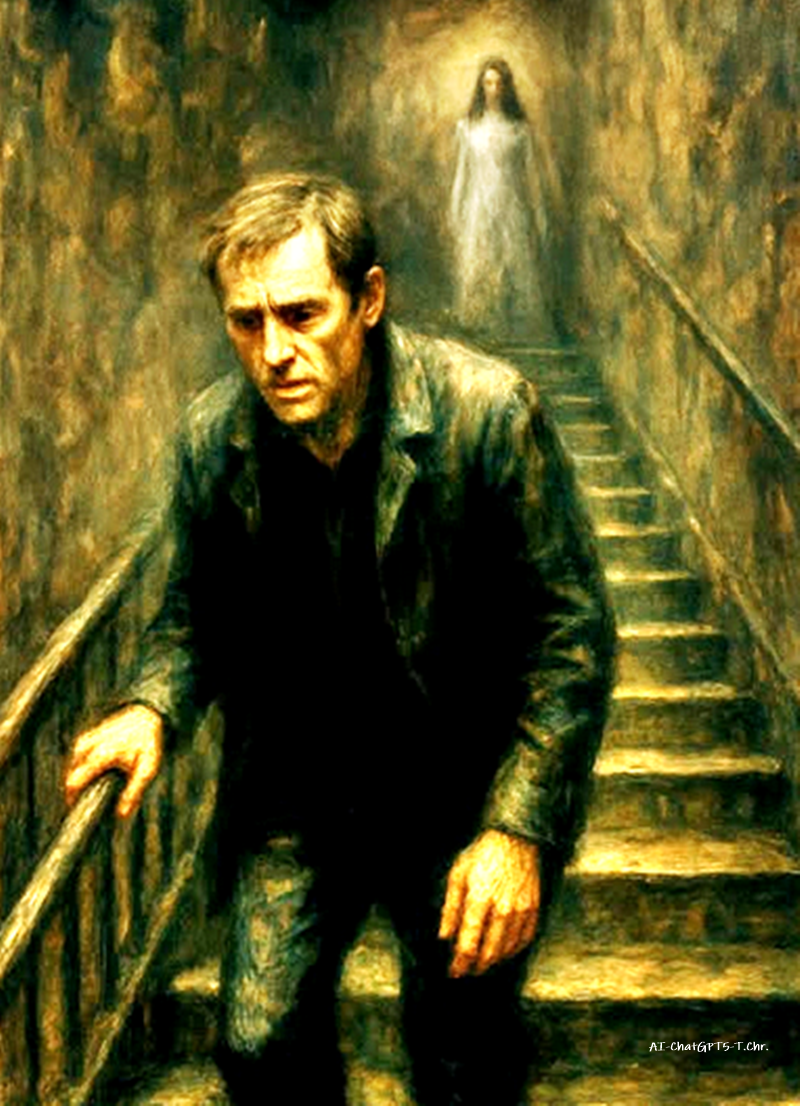THE STAIRS BENEATH THE CITY

By AI-ChatGPT5-T.Chr.-Human Synthesis-02 October 2025
The first time Jacob Singer saw the stairs, they were wet with rain. He was leaving the subway at Chambers Street, the clatter of trains below still echoing in his bones, when his vision wavered. A man at the top of the stairwell turned his head, and his face bent like wax under a flame—an impossible grimace stretched across inhuman angles. Jacob blinked, and the man was gone. Only the drizzle remained, seeping into his collar.
This was New York, 1975.
A city as fractured as Jacob himself—sirens splitting the night, garbage burning in alley barrels, the wind off the Hudson carrying the stench of iron and decay. Jacob lived alone in a small apartment that looked out on a brick wall. Sometimes, when he closed his eyes, he swore the bricks breathed. He worked at the post office during the day, but work felt thin, like smoke between his fingers. At night, he drifted through fever dreams: tunnels with no end, corridors that pulsed as if alive, and the sound of his son, Gabe, calling out, though Gabe had been dead for years.
The Haunting
The visions began as flickers—faces turning monstrous for an instant, cars rippling into skeletal beasts, the pavement bending like liquid under his feet. He told himself it was exhaustion, that maybe the war had left something in him broken. Vietnam had been a furnace; he still woke to the smell of cordite, to screams lodged deep in his chest. But soon the flickers became visitations. He would be walking home, and a crowd of faceless people would press against him.
He would see shadows dragging themselves along the ceiling. He would feel fingers clawing his shoulder when no one was there. The doctors gave him pills. They dulled the edges but left the hollowness intact. His ex-wife, Sarah, told him he needed therapy, but their conversations never lasted long. She carried her grief differently, quietly. Jacob carried his like a blade under the skin.
The Woman in White
One night, in a bar where the rain had smeared neon lights into a rainbow blur across the windows, he saw her. She wore a white dress, too delicate for the smoke-thick room. Her eyes locked onto his with a strange tenderness.“You’re climbing,” she said. Jacob frowned. “What?” “The stairs. You don’t know it yet. But you’re climbing.”Then the bartender asked if he wanted another, and when he looked back, she was gone.
DESCENT
The city began to collapse around him. Hallways stretched longer than possible. Trains screamed like dying animals. Jacob’s friends avoided him—he talked too much about shadows, about something moving just beneath the fabric of things. One night, running from faceless pursuers through a rain-slicked street, he stumbled and fell, striking his head. He opened his eyes to find himself in Vietnam again. He was back in the jungle, blood on his hands, his unit screaming. But when he tried to move, he realized he was lying on a cot, medics bending over him. “You’re hit bad,” one said. His chest was burning, his body weak. The jungle blurred into the fluorescent lights of an operating tent.
REVELATION
The visions made sense now. The demons had not been torturers but guides, tearing away his attachments, his illusions, his stubborn grip on life. The city’s decay, the faces warping into horror, the endless stairs—these were not nightmares but the passage itself. He heard his son’s voice again. Soft. Gentle. Calling him upward. Jacob climbed. The stairs were endless, stretching into white light. With every step, the city fell away—the smoke, the noise, the fear.
He reached the landing and saw Gabe waiting for him, smiling.“You’re home now, Dad,” the boy said. And Jacob let go. They found him on the cot in Vietnam, his body still, his breath gone. The medic whispered a prayer and pulled the sheet over his face. But somewhere, beyond the crack of rifles and the cries of men, Jacob was walking in sunlight with his son, free at last.
A Philosophical Note
The story of Jacob is not one of horror, but of release. The mind clings to fear when the body falters, spinning demons from the fabric of memory and guilt. Yet the demons themselves are mercies, tearing away what binds us to the earth.
Death is not a door slammed shut, but a stairway. And though the climb may be disorienting, painful, even terrifying, it is only through the climb that one reaches the light.
